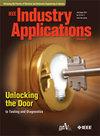不平衡配电网中电动汽车的分布式协调:增强对点对点通信故障的恢复能力
IF 4.2
2区 工程技术
Q2 ENGINEERING, ELECTRICAL & ELECTRONIC
引用次数: 0
摘要
在本文中,我们提出了电动汽车(ev)的协调充放电,通过基于分布式优化的方法实现,该方法具有可扩展性和对通信故障的弹性。在不平衡配电网中,受变压器热约束和节点电压约束的情况下,为使并网电动汽车的经济效益最大化,制定了潜在的优化问题。我们的分布式协调方法以基于共识的乘数交替方向方法(ADMM)为基础,该方法包含相邻电动汽车之间的迭代协商过程。充放电曲线由电动汽车通过点对点通信进行有限的信息交换,在本地(异步)计算。我们证明了我们提出的EV协调算法即使在诸如丢包和EV随机断开等通信故障的情况下也是收敛的。利用IEEE 13节点测试馈线进行的数值模拟,结合电动汽车和住宅负荷的实际经验数据,表明与不协调的电动汽车充电相比,该方法可以降低78%的运营成本,同时保持网络运行限制。在存在通信故障的情况下,与理想的通信网络相比,所提出的方法的收敛速度要慢8倍。本文章由计算机程序翻译,如有差异,请以英文原文为准。
Distributed Coordination of Electric Vehicles in Unbalanced Distribution Grids: Enhancing Resilience to Peer-to-Peer Communication Failures
In this paper, we propose coordinated charging and discharging of Electric Vehicles (EVs), enabled by a distributed optimization-based approach that is scalable and resilient to communication failures. The underlying optimization problem is formulated to maximize the economic benefits for grid-connected EVs, subject to transformer thermal constraints and nodal voltage constraints enforced on an unbalanced distribution grid. Our distributed coordination approach is underpinned by a consensus-based alternating direction method of multipliers (ADMM) that encompasses an iterative negotiation process amongst neighboring EVs. The charge-discharge profiles are computed by EVs locally (and asynchronously) using limited information exchange via peer-to-peer communications. We prove that our proposed EV coordination algorithm converges, even in the event of communication failures such as packet losses and random disconnections of EVs. Numerical simulations with the IEEE 13-node test feeder, incorporating empirical real-life data of EVs and residential loads, show that the proposed approach yields a 78% reduction in operational costs compared to uncoordinated EV charging, while also preserving network operational limits. In the presence of communication failures, the proposed approach resulted in an 8 times slower convergence speed compared to an ideal communication network.
求助全文
通过发布文献求助,成功后即可免费获取论文全文。
去求助
来源期刊

IEEE Transactions on Industry Applications
工程技术-工程:电子与电气
CiteScore
9.90
自引率
9.10%
发文量
747
审稿时长
3.3 months
期刊介绍:
The scope of the IEEE Transactions on Industry Applications includes all scope items of the IEEE Industry Applications Society, that is, the advancement of the theory and practice of electrical and electronic engineering in the development, design, manufacture, and application of electrical systems, apparatus, devices, and controls to the processes and equipment of industry and commerce; the promotion of safe, reliable, and economic installations; industry leadership in energy conservation and environmental, health, and safety issues; the creation of voluntary engineering standards and recommended practices; and the professional development of its membership.
 求助内容:
求助内容: 应助结果提醒方式:
应助结果提醒方式:


